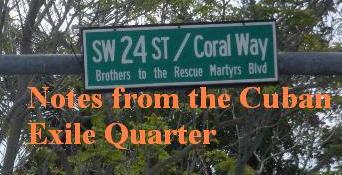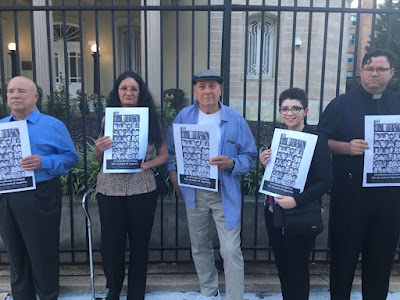 |
| Glenda Corella Cespedes refused entry to Cuba due to critical social media posts. |
Another example of how the Castro regime continues to deny Cubans their right to enter and exit their homeland as a tool to silence dissent and criticism both inside and outside of Cuba was reported in the Canadian press on April 20, 2022.
It is a perverse irony that although "1.3 million Canadians visit Cuba in an average year", Canadian citizens born in Cuba are still treated as second class citizens by their native homeland. CBC news reported on the most recent, and egregious example against Glenda Corella Cespedes.
"Cuban-born Toronto resident Glenda Corella Cespedes told CBC News she was travelling with her non-Cuban friend Mary Guaragna to attend her brother's wedding. She said she was carrying suitcases filled with medications and supplies for her mother, who recently underwent chemotherapy for lung cancer, and for a sick family friend. Corella Cespedes said she had her Canadian passport with her but knew that, as a Cuban citizen, she was required to enter Cuba on a Cuban passport. Cuba charges its citizens $360 for the passport and another $160 every two years. Corella Cespedes said she had paid her fees recently and had her documents in order."
...
"And then I saw five immigration officers come on the plane and they said everyone could get off except Glenda Corella Cespedes." Her friend Mary Guaragna told CBC that "at that point, we both sort of looked at each other and became quite concerned. I mean, I was as white as a ghost and Glenda more so than myself. "Canadians that were exiting the plane were just kind of looking at us as though, you know, we could have been terrorists. We felt awful." The women said one of the officers took Corella Cespedes's passport and left them on the plane for about 20 minutes as cleaners boarded and worked around them. A man who appeared to be a more senior immigration officer then boarded, Guaragna said, and "presented Glenda with a piece of paper saying 'denial.' With no explanation at all. "And I said to this man, who spoke English quite well, 'What seems to be the problem?' In my mind, as a Canadian, [I was] thinking we could debark, go somewhere, speak to them, perhaps even pay a fine and allow my friend to continue on with her vacation. "And he just said, 'She knows what she did, she knows what she did.' And at that point I kind of looked over at Glenda and Glenda sort of gave me a signal to not say anything further."
...
"Corella Cespedes said her problems began when she liked a Facebook comment that criticized a well-connected Communist Party supporter in Gibara who works as a doctor in the local hospital where Corella Cespedes once worked as a nurse.The doctor is part of a three-woman musical group who performed for Cuban Prime Minister Manuel Marrero when he visited earlier this year. After posting video of the performance, the doctor was criticized on social media for serenading Marrero rather than pressing him on the hospital's state of neglect and a lack of medicines and food for patients. A number of critical comments came from former residents of Gibara now living outside of Cuba. The original video has since been deleted. Corella Cespedes said her parents soon began to receive warnings from local Communist Party members to tell their daughter to stop commenting and posting."
The Castro regime blocks Cubans from delivering aid to family members in order to impose its ideological litmus test. This is another example of the expansive internal blockade imposed by the Castro regime that exists in Cuba.
This is another reason to expel Cuba from the UN Human Rights Council.















